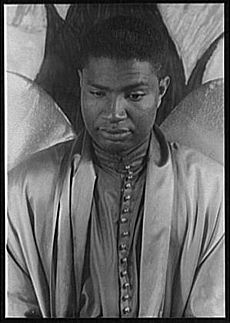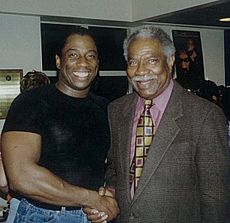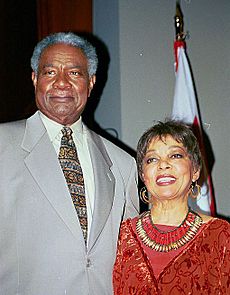Ossie Davis facts for kids
Quick facts for kids
Ossie Davis
|
|
|---|---|
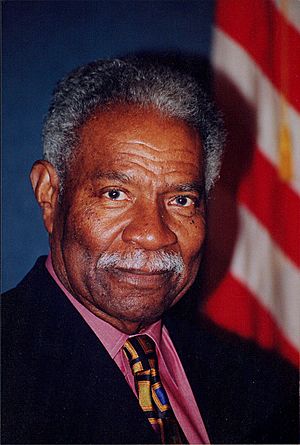
Davis in 2000
|
|
| Born |
Raiford Chatman Davis
December 18, 1917 Cogdell, Georgia, U.S.
|
| Died | February 4, 2005 (aged 87) Miami Beach, Florida, U.S.
|
| Occupation |
|
| Years active | 1939–2005 |
| Spouse(s) | |
| Children | 3, including Guy Davis |
Raiford Chatman "Ossie" Davis (December 18, 1917 – February 4, 2005) was an American actor, director, writer, and activist. He was married to Ruby Dee, who was also an actress. They often worked together.
Ossie Davis and Ruby Dee were honored many times for their work and their efforts to make the world a better place. They were inducted into the NAACP Image Awards Hall of Fame. They also received the National Medal of Arts and the Kennedy Center Honors. In 1994, Ossie Davis joined the American Theater Hall of Fame.
Contents
Early Life and First Steps in Acting
Ossie Davis was born Raiford Chatman Davis in Cogdell, Georgia. His father, Kince Charles Davis, was a railway construction engineer. His mother was Laura Cooper.
He got the name "Ossie" by accident. When his birth certificate was being filled out, the clerk misunderstood his mother saying "R. C. Davis."
From a young age, Ossie experienced racism. For example, the KKK threatened his father because they thought his job was too important for a Black man.
Ossie had several siblings. They included William Conan Davis, a scientist, and Essie Davis Morgan, a social worker.
His parents wanted him to go to Howard University. He did, but he left in 1939. He wanted to become an actor in New York City. He later studied at Columbia University School of General Studies.
Ossie's acting career started in 1939 with the Rose McClendon Players in Harlem. During World War II, he served in the United States Army in the Medical Corps. He first appeared in a movie in 1950. It was the film No Way Out, which also starred Sidney Poitier.
Ossie Davis's Career in Film and TV
When Ossie Davis wanted to act, he faced challenges because of his race. At that time, Black actors often played very simple or stereotypical characters. Ossie wanted to play more serious and respected roles, like Sidney Poitier. When he did play roles like a porter or a butler, he made them feel real, not like a joke.
Ossie Davis was also a notable director. He was one of the few Black directors of his time, along with Melvin Van Peebles and Gordon Parks. He directed movies such as Gordon's War, Black Girl, and Cotton Comes to Harlem.
He was one of the few Black actors before 1970 who found success without playing stereotypical roles. He had important parts in movies like The Hill with Sean Connery. He also appeared in The Cardinal and The Scalphunters.
Later in his life, Ossie Davis became well-known for working in several films by director Spike Lee. These movies include School Daze, Do The Right Thing, Jungle Fever, She Hate Me, and Get on the Bus.
He also did voice-over work for commercials. He was the narrator for the TV show Evening Shade in the early 1990s. This show starred Burt Reynolds.
Ossie Davis appeared in other popular films in the 1990s. These included Grumpy Old Men, The Client, and Dr. Dolittle. He also voiced Anansi the spider on the PBS children's show Sesame Street.
His last acting role was in the TV drama series The L Word. He played a father who was learning to accept his daughter's family. The episode where his character passed away aired shortly after Ossie Davis's own death. It was dedicated to him.
Honors and Awards
In 1989, Ossie Davis and his wife, Ruby Dee, were honored by the NAACP Image Awards. They were added to the Hall of Fame.
In 1995, they received the National Medal of Arts. This is the highest honor for an artist in the United States. The President presents it at the White House.
In 2004, they were given the prestigious Kennedy Center Honors. This award recognizes people for their lifelong contributions to American culture through the performing arts. These include dance, music, theater, movies, or television. The main rule for choosing winners is excellence.
In 1994, Ossie Davis was inducted into the American Theater Hall of Fame. This recognized his important contributions to theater.
Ossie Davis's Activism and Civil Rights Work
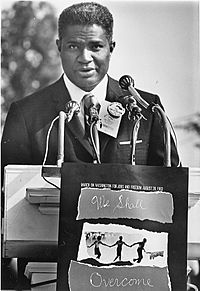
Ossie Davis and Ruby Dee were well-known for their work as civil rights activists. They were active during the Civil Rights Movement. They were close friends with important leaders like Malcolm X, Jesse Jackson, and Martin Luther King Jr..
They helped organize the 1963 civil rights March on Washington for Jobs and Freedom. They also served as the hosts for this historic event.
Ossie Davis delivered the eulogy (a speech at a funeral) for Malcolm X. He later repeated part of this speech in Spike Lee's film Malcolm X. He also gave a powerful tribute to Dr. Martin Luther King Jr. in New York City after King was assassinated.
Personal Life and Family
In 1948, Ossie Davis married actress Ruby Dee. They met while working on the play Jeb in 1946.
In the mid-1960s, they moved to New Rochelle. They lived there for the rest of their lives.
Their son, Guy Davis, is a blues musician and former actor. He appeared in the film Beat Street and the TV show One Life to Live. They also had two daughters, Nora Davis Day and Hasna Muhammad.
Death and Legacy
Ossie Davis passed away in a Miami Beach hotel room on February 4, 2005. He was 87 years old. The official cause of death was not released, but he had heart problems. His ashes were buried at Ferncliff Cemetery.
His funeral was held in New York City. Many people attended, including his children, grandchildren, and famous friends. Speakers included Alan Alda, Burt Reynolds, Spike Lee, Maya Angelou, and former president Bill Clinton. Wynton Marsalis performed music.
Burt Reynolds said that Ossie Davis taught him what a true man is. Attallah Shabazz, Malcolm X's oldest daughter, spoke about how Ossie Davis supported her family after her father's death. Bill Clinton praised Davis, saying he would have been a great president.
Harry Belafonte delivered the eulogy. He said that Ossie Davis "embraced the greatest forces of our times." He mentioned leaders like Paul Robeson, Eleanor Roosevelt, and Nelson Mandela. Belafonte said it was hard to imagine life without Ossie's wisdom and strength. He added that everyone was lucky to have had him for so long.
Ossie Davis left behind a legacy as a talented artist and a dedicated activist. He used his voice and his art to fight for justice and equality.
Images for kids
See also
 In Spanish: Ossie Davis para niños
In Spanish: Ossie Davis para niños
 | Madam C. J. Walker |
 | Janet Emerson Bashen |
 | Annie Turnbo Malone |
 | Maggie L. Walker |


